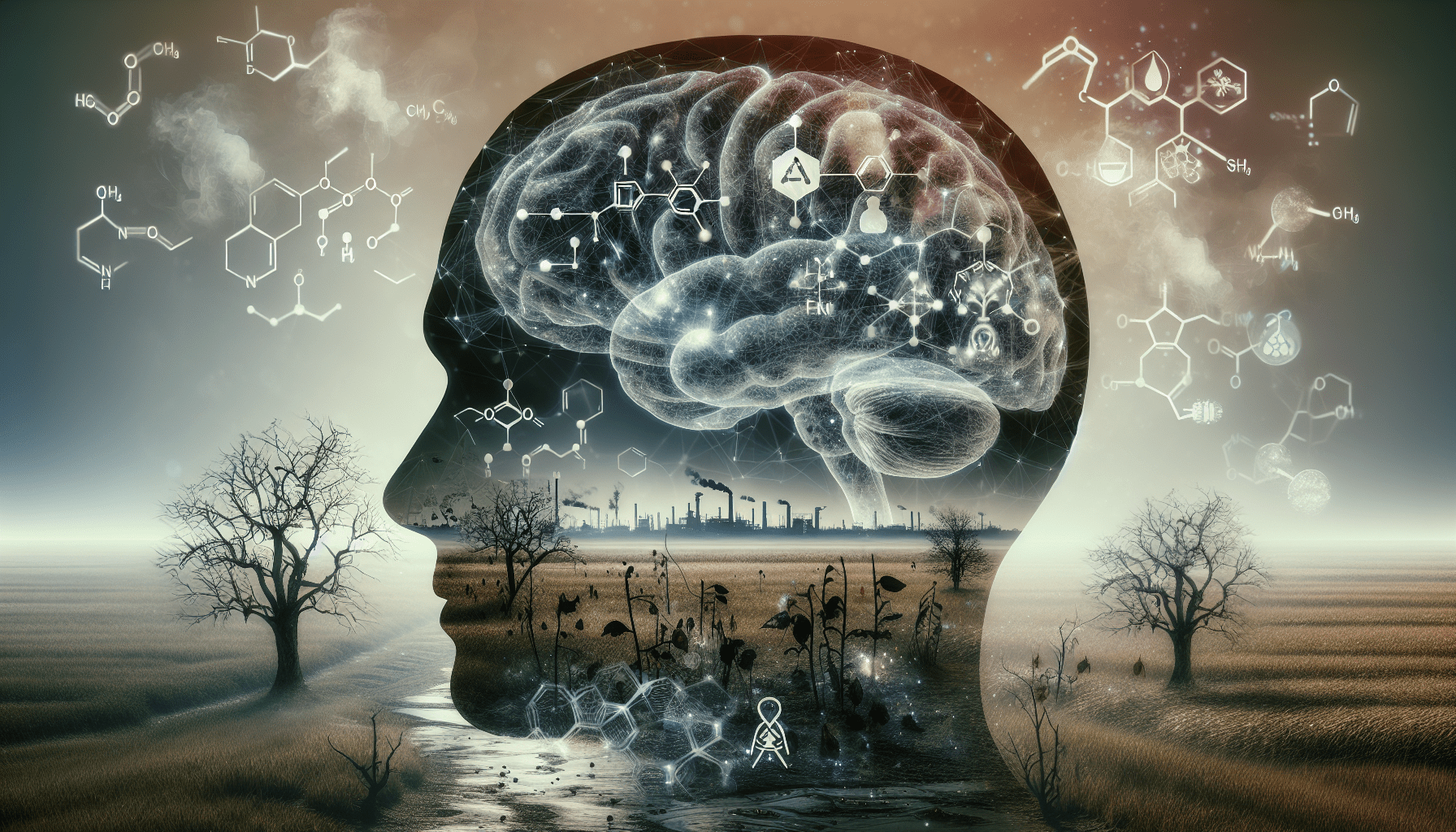Can cognitive decline be caused by exposure to environmental toxins? This is a question that has sparked considerable interest and concern among researchers, health professionals, and the public. Given the myriad of toxins present in our environment—from heavy metals like lead and mercury to man-made chemicals such as pesticides and industrial pollutants—the potential impacts on human health, particularly cognitive function, are critical to understanding.

Understanding Cognitive Decline
What is Cognitive Decline?
Cognitive decline refers to the gradual loss of cognitive functions, including memory, language, thinking, and judgment. While it is a natural part of the aging process, certain factors can accelerate or exacerbate it. This can range from age-related cognitive impairment to severe conditions like Alzheimer's disease and other forms of dementia. Identifying and mitigating these factors is crucial to maintaining mental health and quality of life.
Symptoms and Stages
Cognitive decline can manifest in various ways, including memory loss, difficulty concentrating, confusion, and impaired judgment. It often begins subtly but can progress to more serious conditions if not addressed. Understanding these symptoms and stages is vital for early detection and intervention.
| Stages of Cognitive Decline | Symptoms |
|---|---|
| Mild Cognitive Impairment | Forgetfulness, slight difficulty in concentrating, occasional disorientation |
| Moderate Cognitive Decline | Noticeable forgetfulness, confusion, and difficulty with language or calculations |
| Severe Cognitive Decline | Significant memory loss, severe disorientation, and inability to perform daily tasks |
Environmental Toxins and Their Sources
What are Environmental Toxins?
Environmental toxins are harmful chemicals and pollutants found in our surroundings, which can come from natural or man-made sources. These toxins can have adverse effects on human health, particularly when exposure occurs over extended periods.
Common Sources of Environmental Toxins
Environmental toxins can be found in air, water, soil, and even in the food we eat. Some common sources include:
- Industrial Pollutants: Factories and industrial plants are significant sources of pollutants like heavy metals.
- Agricultural Chemicals: Pesticides and herbicides used in farming can contaminate food and water supplies.
- Household Products: Everyday items such as cleaning agents, paints, and personal care products can contain harmful chemicals.
- Automobile Emissions: Vehicles release a variety of pollutants, including carbon monoxide and nitrogen oxides, into the air.
| Toxin | Common Source | Potential Exposure Route |
|---|---|---|
| Lead | Paint, pipes, gasoline | Inhalation, ingestion |
| Mercury | Fish, industrial emissions | Inhalation, ingestion |
| Pesticides | Agricultural runoff | Ingestion, dermal contact |
| PCBs (Polychlorinated Biphenyls) | Electrical equipment | Inhalation, ingestion |
| Asbestos | Insulation, construction materials | Inhalation |
Mechanisms of Cognitive Decline Due to Toxins
How Do Toxins Affect the Brain?
Understanding the mechanisms by which toxins impact cognitive function involves looking at how these chemicals interact with brain physiology. Some of the ways they exert their effects include:
- Neuroinflammation: Toxins can cause inflammation in the brain, which damages neurons and impairs brain function.
- Oxidative Stress: Certain chemicals induce oxidative stress, where an excess of free radicals overwhelms the body's antioxidant defenses, resulting in cellular damage.
- Neurotransmitter Disruption: Toxins can interfere with the production, release, or reuptake of neurotransmitters, affecting communication between neurons.
- Cell Death: Chronic exposure to certain toxins can lead to cell death, thereby reducing the number of functional neurons.
Specific Toxins and Their Impact
Lead
Lead is a heavy metal that has been used in a variety of products, from paint to gasoline. It is highly toxic and can have devastating effects on the nervous system. Chronic exposure to lead has been linked to cognitive deficits, lower IQ, and increased risk of dementia.
Mercury
Mercury is another heavy metal found in industrial emissions and contaminated fish. It is particularly harmful to the developing brain, but it can also affect cognitive function in adults. Mercury exposure has been associated with memory loss, difficulty in concentrating, and other cognitive deficits.
Pesticides
Pesticides are widely used in agriculture to protect crops from pests. However, these chemicals can be neurotoxic. Studies have shown that long-term exposure to pesticides can lead to cognitive impairments, including difficulties with memory, attention, and executive function.
PCBs
Polychlorinated Biphenyls (PCBs) are industrial chemicals that were widely used before being banned in many countries due to their health risks. PCBs are persistent in the environment and can accumulate in the food chain. Exposure to PCBs has been linked to cognitive decline, particularly in terms of memory and learning.
Research Findings and Studies
Epidemiological Studies
Several epidemiological studies have explored the relationship between environmental toxins and cognitive decline. These studies often involve large populations and long-term follow-ups to identify patterns and correlations.
Study on Lead Exposure
One notable study found that children exposed to high levels of lead exhibited significant cognitive impairments that persisted into adulthood. Even low levels of lead exposure were associated with reduced cognitive performance.
Study on Pesticides and Farm Workers
Research on agricultural workers exposed to pesticides revealed higher rates of cognitive decline compared to those with minimal exposure. The findings suggest a dose-response relationship, where higher levels of exposure lead to greater cognitive deficits.
Clinical Trials and Animal Studies
In addition to epidemiological research, clinical trials and animal studies provide valuable insights into how environmental toxins affect cognitive function.
Animal Study on Mercury
An animal study on mice exposed to mercury showed significant cognitive impairments, particularly in tasks requiring memory and learning. The study also found evidence of neuroinflammation and oxidative stress in the brains of the exposed mice.
Clinical Trial on Antioxidants
In a clinical trial involving humans, researchers investigated whether antioxidant supplements could mitigate the cognitive effects of toxin exposure. The findings were promising, indicating that antioxidants could help reduce oxidative stress and support cognitive function.

Mitigation and Prevention
Reducing Exposure
One of the most effective ways to mitigate the effects of environmental toxins on cognitive health is to reduce exposure. This can be achieved through various strategies:
- Regulatory Measures: Governments can implement stricter regulations on the use and disposal of harmful chemicals.
- Public Awareness: Educating the public about the sources and risks of environmental toxins can encourage safer behaviors.
- Personal Choices: Making informed choices about the products you use and the food you eat can help minimize exposure.
Detoxification and Treatment
Detoxification Methods
Detoxification involves removing harmful substances from the body. While the body's natural detox systems, mainly the liver and kidneys, work tirelessly to eliminate toxins, sometimes they need a little help, especially if you've been exposed to high levels of toxins.
Chelation Therapy
Chelation therapy is a medical procedure that involves the administration of chelating agents to remove heavy metals from the body. It's often used for cases of lead or mercury poisoning but has sparked interest in its potential for mitigating cognitive decline due to toxin exposure. However, it should be approached cautiously and under medical supervision.
Antioxidants
Antioxidants neutralize free radicals, helping to reduce oxidative stress. Foods rich in antioxidants, such as berries, nuts, and leafy greens, or supplements like vitamin E and C, can support your body's detox processes and may help protect cognitive function.
| Antioxidant Source | Examples |
|---|---|
| Fruits and Vegetables | Berries, oranges, spinach, kale |
| Nuts and Seeds | Almonds, walnuts, sunflower seeds |
| Supplements | Vitamin E, Vitamin C, Coenzyme Q10 |
Cognitive Therapies
While reducing exposure to toxins is crucial, addressing existing cognitive decline involves a combination of therapies aimed at improving brain function.
Cognitive Rehabilitation
Cognitive rehabilitation involves structured activities and exercises designed to improve specific cognitive functions, such as memory, attention, and problem-solving skills. It can be particularly beneficial for individuals who have already experienced some cognitive decline due to toxin exposure.
Pharmacological Interventions
In some cases, medication may be prescribed to manage symptoms of cognitive decline. These might include drugs that enhance neurotransmitter function or medications that address underlying conditions like hypertension or diabetes, which can exacerbate cognitive issues.
Lifestyle Factors and Cognitive Health
Diet and Nutrition
A balanced diet rich in essential nutrients can support overall brain health and cognitive function. Here are some dietary considerations that can help bolster your cognitive reserves:
- Omega-3 Fatty Acids: Found in fish, flaxseed, and walnuts, omega-3 fatty acids support brain health.
- Antioxidants: As previously mentioned, foods high in antioxidants combat oxidative stress and may protect against cognitive decline.
- Hydration: Staying well-hydrated is crucial for maintaining optimal brain function.
Physical Activity
Regular physical activity has been shown to improve cognitive function and reduce the risk of cognitive decline. Exercise increases blood flow to the brain, promotes neurogenesis (the creation of new neurons), and reduces inflammation.
Mental Stimulation
Keeping your brain active through mental exercises such as puzzles, reading, and learning new skills can help maintain cognitive function as you age.

Conclusion
The link between environmental toxins and cognitive decline is a serious and growing concern. While natural aging processes are inevitable, exposure to harmful chemicals can accelerate cognitive decline and lead to severe impairments. By understanding the sources of these toxins, their mechanisms of action, and the research findings, you can take informed steps to mitigate their effects.
Reducing exposure through regulatory measures, increasing public awareness, and making mindful personal choices are crucial. Additionally, incorporating detoxification methods, cognitive therapies, and lifestyle changes can help protect and enhance cognitive health. Ongoing research and clinical trials continue to shed light on this critical issue, offering hope for more effective prevention and treatment strategies in the future.
By taking proactive steps, you can better navigate the complexities of environmental toxins and safeguard your cognitive health. Remember, your brain is a precious asset—protect it wisely.

